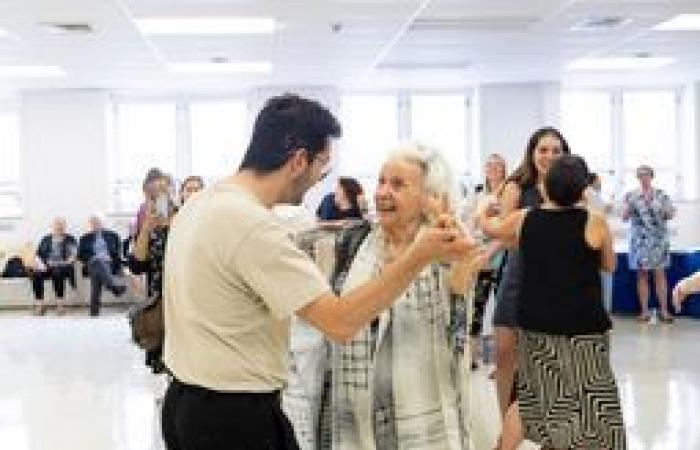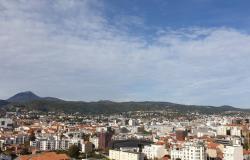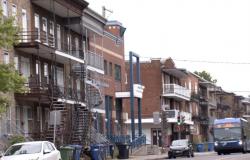Ahlem Ammar, dean of the Faculty of Educational Sciences at UdeM, Gisèle Barret, retired professor of the Faculty of Educational Sciences, and Alexandre Chabot, secretary general of the University
Credit: Cindy Boyce
“I’ve been receiving tributes for two years… I’m going to end up believing that I’m already dead.” Gisèle Barret laughs at the situation: at 94, the former professor seems more lively and facetious than ever. Today, it is the Faculty of Educational Sciences of the University of Montreal which salutes his founding work on dramatic expression and situational pedagogy. Room B-253 of the Marie-Victorin pavilion will now bear her name and that of her husband, the painter Pierre Barret. Beyond its touch of humor, this tribute delights her, she who so influenced teaching in the 1970s.
“It’s obviously moving! recognized the one who taught at UdeM for 30 years. I “built” this room, I organized it, I used it for my classes. Over time, it became a meeting room, one of the largest in the Faculty of Education. And there you have it: in a way, today, it becomes my room again…”
The ceremony organized by his alma mater brought together several dozen relatives and guests, including Ahlem Ammar, dean of the faculty, and Alexandre Chabot, secretary general of the University of Montreal. On the walls of room B-253, photos of her classes and paintings by her husband – also a professor at UdeM, but who died seven years ago – remind us of the extent to which “the Barrets” left their mark on the University of 1970s-1980s.
A know-how as much as a know-how
Gisèle Barret could have been content to quietly enjoy the ceremony, but, true to her teaching practice, she will choose to gently hack the codes. While pianist Denis Gagné, soprano Anne-Marie Beaudette and tenor Julien Girard sang a famous tune, the honoree encouraged everyone in attendance to launch into an impromptu waltz. Before putting her words into words! A way of reminding us that, in this room, his pedagogy of the situation has always given pride of place to bodies, movements and self-expression to transmit to students both interpersonal skills and know-how. . To give them the courage, she often says, to be who they are.
“Teachers don’t need a toolbox for this, they are their own toolbox,” she explained of her method. The only resource is to start from yourself, to use what you feel, to take advantage of the place and the situation, then to construct an educational or artistic theme according to the needs of the classes.” His influence was such that the Quebec Ministry of Education entrusted him in 1970 with the writing of dramatic expression programs and educational guides.
To the question of what remains today of her educational innovations, Gisèle Barret answers that they have undoubtedly infused, taking new names or new forms. “Like water, it goes into the earth, it leaves and it comes out somewhere,” she said. This perspective pleases me a lot because it says the essential thing: everyone must find their own solutions within themselves.”
“Philanthropy is the corollary of gratitude”
Gisèle Barret, retired professor from the Faculty of Educational Sciences at the University of Montreal
Credit: Cindy Boyce
Now a philanthropist, Gisèle Barret intends to continue following the path she began to trace 50 years ago, within the walls of this faculty. “Philanthropy is the corollary of gratitude”, she repeats to anyone who will listen. Result: she has already donated more than half a million dollars to the University of Montreal, including $140,000 to the Le français, une culture program.
“Thanks to this program, our students interact with people who have chosen to put language at the heart of their lives,” said Marie-Claude Boivin, professor and associate vice-dean of the French language at the faculty. They benefit from a real encounter, a real dialogue through workshops and experiences that connect language with art and expression.” A commitment that matches that of the fourth pillar of the philanthropic campaign The hour is brave: “Foster the development of communities.”
Visibly moved by the speeches of Alexandre Chabot, Ahlem Ammar and Marie-Claude Boivin, Gisèle Barret also wanted to address a few words to her guests: “With a good brain, we do many things, -she said, but we can’t love. To do this, you need a heart and a body. So, come back within yourself, know who you are, what you want, what you feel and express it!” His last words will also be to encourage those present, too static for his taste, to move, circulate, stroll and exchange with their neighbor. As before, in room B-253.
#Canada







